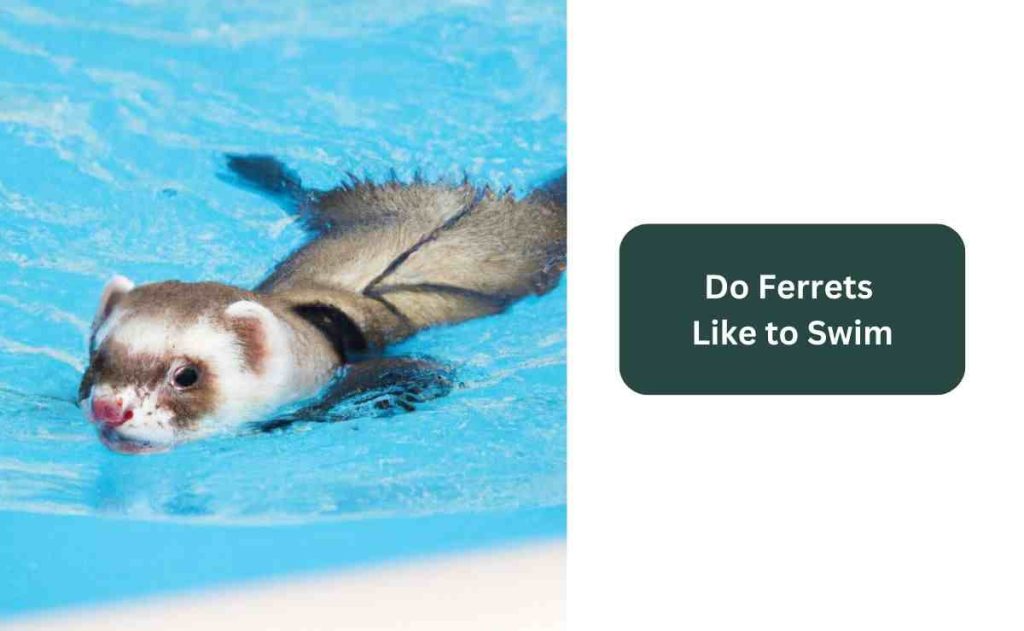Ferrets are popular pets, known for their playful and mischievous personalities. With their curious nature and energetic demeanor, many owners wonder if ferrets enjoy swimming as much as they do running around and exploring. While some may assume that all small animals are natural swimmers, the truth is that not all ferrets have a love for the water.
In this article, we will explore whether or not ferrets like to swim. We’ll take a closer look at why some may be more inclined to take a dip than others, what precautions should be taken when introducing them to water, and how to provide a safe and enjoyable swimming experience for these furry friends. So let’s dive in!
Do Ferrets Like to Swim?

Yes, ferrets can and do enjoy swimming! They are naturally strong swimmers and have been known to take unsupervised dips in pools, ponds, and other bodies of water.
Ferrets are curious creatures by nature and often explore their environment through play. If given the opportunity to swim, they may be more than happy to take a dip! It is important to remember that ferrets need supervision when in or near water as they may become tired quickly or not be able to get out of the water on their own.
It is also important to note that some ferrets may not take to swimming right away; it could take a few attempts before they feel comfortable enough with the activity. Be sure to use positive reinforcement such as treats or verbal encouragement when introducing your ferret to swimming.
Can Ferrets Swim?
Yes, ferrets can swim! They are quite capable swimmers and enjoy being in the water. However, it is important to note that ferrets should always be supervised when swimming, as they can tire quickly and may need assistance getting out of the water.
Ferrets have a natural affinity for water and will often play in shallow puddles or bathtubs if given the chance. If you plan to take your ferret swimming, it is best to do so in a controlled environment such as a pool or lake where there are no strong currents or deep areas.
It is also important to provide flotation devices for your ferret, such as a life vest or floatation device designed specifically for small animals. This will help keep them safe and make sure they don’t tire out too quickly.
Overall, ferrets can enjoy swimming with proper supervision and safety measures in place.
How to introduce A Pet Ferret to Water?
Introducing a ferret to water can be a fun and rewarding experience for both you and your pet.
The best way to get your ferret used to water is to start slowly. Begin by offering them shallow dishes of water, such as in a kiddie pool or bathtub. Allow them to explore the water at their own pace, and reward them with treats when they show interest. Gradually increase the depth of the water until your ferret is comfortable swimming in it.
Once your ferret is comfortable with shallow water, you can begin introducing them to deeper bodies of water like swimming pools or ponds. Make sure that all safety precautions are taken, such as having a life jacket on hand and supervising your pet at all times. With patience and positive reinforcement, your ferret will soon become an expert swimmer!
Can A Ferret Swim Underwater?
Yes, ferrets can swim underwater. They are quite capable of holding their breath and swimming for a few seconds at a time. In the wild, ferrets use this skill to hunt fish and other aquatic prey.
However, most domesticated ferrets are not strong swimmers and should not be allowed to swim in open water without supervision. Ferrets don’t have the same natural instinct as some other animals when it comes to swimming, so they may tire quickly or struggle to stay afloat.
It’s important to provide them with a safe environment if you decide to let them take a dip.
If you do choose to let your ferret swim, make sure there is a shallow area they can stand in if they become tired or need a break from the water. You should also watch your pet closely while they are swimming and be prepared to intervene if necessary.
How Often Can A Ferret Swim?
Ferrets can swim, but they usually don’t enjoy it always and should not be forced to do so. If you decide to take your ferret swimming, it should only be done in shallow water for a short period of time. It is important to keep an eye on them at all times while they are in the water and never leave them unattended.
It is recommended that ferrets only swim once or twice a month at most. This helps prevent any potential health risks associated with swimming, such as ear infections or skin irritation.
Be sure to thoroughly dry your ferret after each swim and check for any signs of discomfort or distress.
Overall, swimming is not necessary for ferrets and should be done sparingly if at all required. If you choose to take your ferret swimming, make sure it is done safely and responsibly so that your pet stays healthy and happy!
How Long Can A Ferret Stay in The Water?
Ferrets are not built to be swimmers, so it’s important to keep their time in the water short. Generally speaking, a ferret can stay in the water for up to 15 minutes before they begin to tire out and become uncomfortable. If they are swimming or playing in shallow water, you should check on them every 5 minutes or so just to make sure they’re doing okay.
It’s also important to note that ferrets have no natural defense against cold water. Even if it’s warm outside, the water temperature could still be too cold for them. So if you plan on taking your ferret swimming, make sure you monitor the temperature of the water closely and don’t let them stay in for too long.
Finally, it’s always best to supervise your ferret when they’re near any body of water. This will help ensure their safety and prevent any accidents from happening while they play.
What Are The Negative Sides of Swimming for Ferrets?
Swimming can be a great exercise for ferrets, but there are some potential risks that should be considered.
First, ferrets are not natural swimmers and may need to be taught how to swim. If they are not taught properly and given the right level of supervision, they could be at risk of drowning. Moreover, the chlorine in swimming pools and other bodies of water can irritate their skin and eyes.
Furthermore, if a ferret does get wet it is important to dry them off quickly as they have very thick fur that can take a long time to dry naturally. This could leave them vulnerable to catching a chill or getting an infection from being damp for too long.
Swimming can be an enjoyable activity for ferrets with the proper supervision and care taken into consideration. However, it is essential to understand all the potential risks associated with this activity before allowing your pet ferret to take part in it.
Conclusion
Ferrets can enjoy swimming if introduced to water at a young age and given proper supervision. While not all ferrets will take to water, those that do can benefit from the exercise and stimulation it provides.
It is important to always prioritize the safety and comfort of your furry friend when introducing them to new experiences.
If you are considering introducing your ferret to swimming, consult with a veterinarian and gather all necessary supplies beforehand. With patience and care, you may find that your ferret is a natural swimmer!
